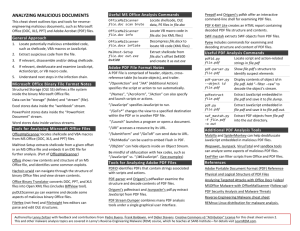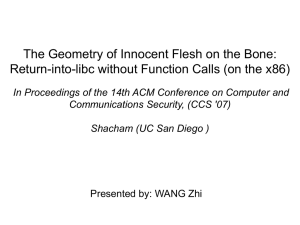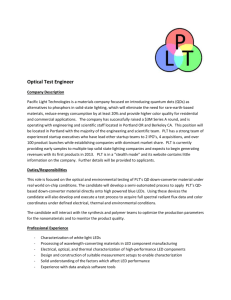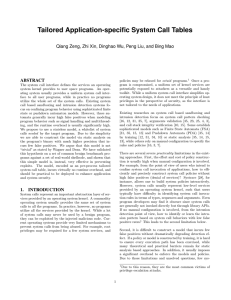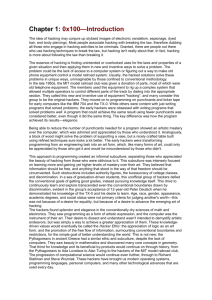Runtime Process Insemination
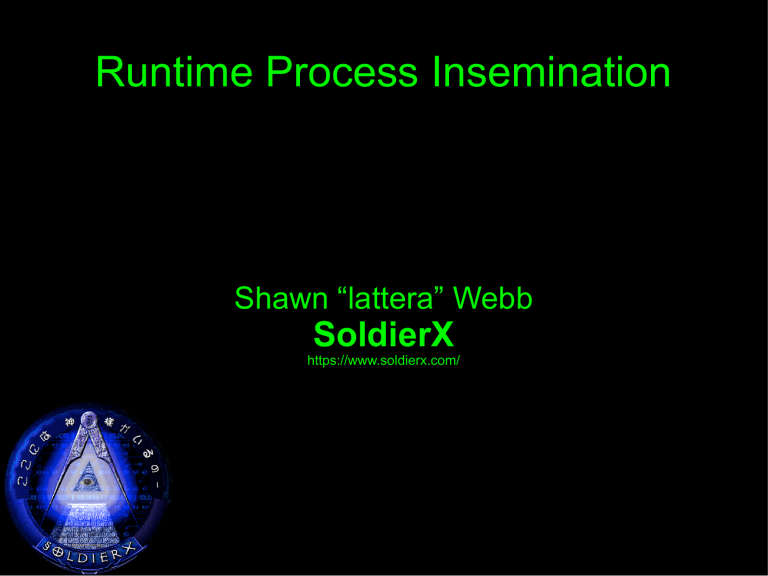
Runtime Process Insemination
Shawn “lattera” Webb
SoldierX
https://www.soldierx.com/
Who Am I?
Just another blogger
Professional Security Analyst
Twelve-year C89 programmer
Member of SoldierX, BinRev, and Hack3r
Disclaimers
Opinions/views expressed here are mine, not my employer’s
Talk is semi-random
Tied together at the end
Almost nothing new explained
Theory known
New technique
Presentation and tools only for educational purposes
Assumptions
Linux? What's that?
Concepts carry over to Windows and OSX
Basic knowledge of C and 32bit Linux memory management
Ability and desire to think abstractly
Non-modified memory layout (NO grsec/pax)
History
CGI/Web App vulnerabilities
Needed connect-back shellcode
Needed reliable, random access
− Firewall holes are a problem
−
Needed way to reuse existing connection to web server
Needed to covertly sniff traffic
Libhijack is born (discussed later)
Setting the Stage
Got a shell via CGI/Web App exploit
Reliable way to get back in
Apache good candidate
− Already listening for connections
Modify apache process somehow to run a shell when a special string is sent
− i.e. GET /shell HTTP/1.1
$ whoami apache
Need to hook certain functions in runtime
Current Techniques
Store shellcode on the stack
Stack is non-executable
Store shellcode at $eip
Mucks up original code
Store shellcode on the heap
Heap is non-executable
LD_PRELOAD?
Process has already started
Process Loading
execve is called
Kernel checks file existence, permissions, etc.
Kernel loads RTLD (Runtime Linker (ld.elf.so))
Kernel loads process meta-data, initializes stack
Meta-data loaded at 0x08048000 on Intel 32bit
Linux
Runtime Linker
Loads process into memory
Loads dependencies (shared objects)
DT_NEEDED entries in the .dynamic section
Patches PLT/GOT for needed dynamic functions
Calls initialization routines
Finally calls main()
ELF
Executable and
Linkable Format
PE-COFF based on
ELF
Meta-data
Tells RTLD what to load and how to load it
ELF
Describes where to load different parts of the object file
Process Header (PHDR) – Minimum one entry; contains virtual address locations, access rights
(read, write, execute), alignment
Section Header (SHDR) – Minimum zero entries; describes the PHDRs; contains string table, debugging entries (if any), compiler comments
Dynamic Headers – Contains relocation entries, stubs, PLT/GOT (jackpot)
Process Tracing
Ptrace – Debugging facility for Linux
Kernel syscall
GDB relies on ptrace
Read/write from/to memory
Get/set registers
Debugee becomes child of debugger
Destructive
−
Original ptrace engineer evil, likely knew it could be abused
Allocating Memory
We have arbitrary code to store. Where?
Allocate memory in child
Unlike Windows and OSX, we cannot allocate from the parent process, the child must allocate
Find “int 0x80” opcode
Program's main code won't call kernel
Calls library functions which call the kernel
− Libc!
Find a library function that calls the kernel by crawling the ELF meta-data
Allocating Memory
Parse ELF headers, loaded at 0x08048000
Headers include lists of loaded functions
Back up registers
Set $eip to address of found “int 0x80” opcode
Set up stack to call mmap syscall
Continue execution until mmap finishes
Injecting Shellcode
After calling mmap
$eax contains address of newly-allocated mapping
Can write to it
− Even if mapping is marked non-writable (PROT_READ |
PROT_EXECUTE)
Restore the backed-up registers
Decrement $esp by sizeof(unsigned long)
Simulate pushing $eip onto the stack for return address
Injecting Shellcode
Write shellcode to newly-allocated mapping
Set $eip to address of the shellcode
Detach from the process
Sit back, relax, and enjoy life
But wait! There's more!
Hijacking Functions
Global Offset Table/Procedure Linkage Table
Array of function addresses
All referenced functions are in GOT/PLT
PLT/GOT redirection
Shellcode[“\x11\x11\x11\x11”] = @Function
GOT[@Function] = @Shellcode
Can hijack, but cannot reliably remove hijack
Injecting Shared Objects
Why?
Don't have to write a ton of shellcode
Write in C, use other libraries, possibilities are endless
Two ways of doing it
The cheating way: Use a stub shellcode that calls dlopen()
The real way: rewrite dlopen()
The Cheating Way
Allocate a new memory mapping
Store auxiliary data in mapping
.so path
Name of the function to hijack
Stub shellcode
Stub shellcode will:
Call dlopen and dlsym
Replace GOT entry with entry found via dlsym
The Cheating Way
Advantages
Easy
Extendable
Fast
Disadvantages
Entry in /proc/pid/maps
Rely on stub shellcode
The Real Way
Reimplement dlopen
Load dependencies (deps can be loaded via real dlopen)
Create memory maps
Write .so data to new memory maps
Patch into the RTLD
Run init routines
Hijack GOT
The Real Way
Advantages
Completely anonymous
Extensible
Disadvantages
Takes time to research and implement
Shared Objects
Shared objects can have dependencies
Shared objects have own PLT/GOT
Loop through Dynamic structures found in linkmap
Use same PLT/GOT technique against shared objects
Even shared objects loaded via dlopen
Libhijack
Libhijack makes injection of arbitrary code and hijack of dynamically-loaded functions easy
Shared objects via the cheating method
Inject shellcode in as little as eight lines of C code
Full 32bit and 64bit support
Other OSs coming soon
Always looking for help https://github.com/lattera/libhijack
Libhijack Release 0.5
At the end of the day, I'll release version 0.5 of libhijack
Uncached function searching
Hijack within shared objects
Breaks existing (0.3, 0.4) API
Various bug fixes
Libhijack TODO
Version 0.6
Figure out why certain functions don’t show up in
GOT resolution (Known 0.5 bug)
Inject shared objects via “The Real Way”
Possible FreeBSD port
Always looking for help
Prevention
Make sure PLT/GOT entries point to correct lib
How? Symbol table resolution?
Use dtrace, disable ptrace
From Solaris
Non-destructive debugging
Limit ptrace usage (apache user shouldn't use it)
Hypervisor?
Grsec/PAX
Only protects to a certain extent
Demo
Assembly loading .so
exit(0);
Comments/questions
Thanks





